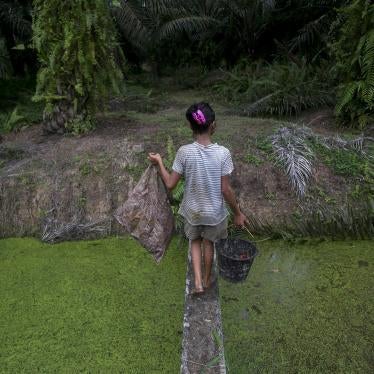(Geneva) - Governments, trade unions, and employers' organizations should combat child labor by adopting a new international treaty on the rights of domestic workers, Human Rights Watch said today in advance of the World Day Against Child Labor, June 12. Members of the International Labor Organization (ILO) will conclude two years of negotiations on the Convention on Decent Work for Domestic Workers on June 10, 2011, and vote on adoption on June 16.
The convention will establish the first global standards for domestic workers. The ILO says that children make up nearly 30 percent of the world's estimated 50 to 100 million domestic workers. Human Rights Watch investigations on child domestic workers in El Salvador, Guinea, Indonesia, Morocco, and Togo have found that some children begin work as early as age 6 and work up to 16 hours a day, 7 days a week. They are paid poorly and vulnerable to physical and sexual abuse.
"Instead of being in school, millions of girls work for extremely long hours and little pay, at risk of abuse and invisible to the outside world," said Jo Becker, children's rights advocate at Human Rights Watch. "This convention would require governments to include these child domestic workers under their child labor laws and to step in to prevent them from being exploited."
Human Rights Watch urged all members of the ILO to vote in favor of adoption of the proposed Convention at the International Labor Conference, and for member states to ratify the treaty quickly.
More girls are in the domestic labor work force than in any other kind of work, according to the ILO. Their tasks include cooking, cleaning, shopping, washing and ironing clothes, and caring for children and elderly members of their employer's household.
Many governments currently exclude child domestic workers from national child labor laws. Most are paid far below the prevailing minimum wage, and some are not paid at all. Few attend school. One Human Rights Watch study in Indonesia found that only 1 of 45 child domestic workers interviewed was attending school.
The vast majority of child domestic workers are girls. Working in private homes, many report sexual harassment and abuse from men in the household, and physical abuse by their employers. Some girls interviewed by Human Rights Watch reported that they were beaten on a daily basis.
The proposed ILO convention would require governments to protect domestic workers from violence and abuse, and provide equal treatment with other workers in working hours, overtime compensation, and daily and weekly rest periods. It would oblige governments to set a minimum age for domestic workers and to ensure that work by child domestic workers above that age does not interfere with their education. An accompanying recommendation urges governments to limit strictly the working hours of child domestic workers and to prohibit domestic work that would harm their health, safety, or morals.
"If this convention is adopted, governments will no longer be able to turn a blind eye to child domestic workers," Becker said. "It will improve working conditions for child domestic workers, and give them a chance to pursue an education and break out of poverty."






